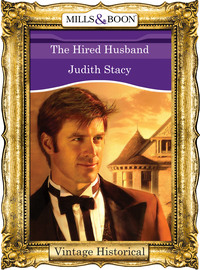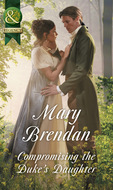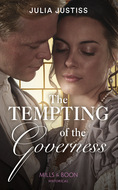Książki nie można pobrać jako pliku, ale można ją czytać w naszej aplikacji lub online na stronie.
Czytaj książkę: «The Hired Husband»
“You said you’d stay,” she told him.
“Until my job was done. This is what I do, Rachel. I figure out a recovery plan, then move on.”
Her heart raced. “But you can’t just abandon us.”
“I’ve done all here that I can do.”
“This puts me right back where I started. I don’t know anyone capable of taking over the business,” Rachel said. “I don’t know who to turn to, who to trust. There must be some way I can get you to stay. I’ll increase your fee.”
Mitch pushed out of the chair. “That’s not how I work.”
“I’ll double it again. Triple it.”
“No.”
She squeezed her hands into fists. “There must be some way I can get you to stay. Something I can do. Something I can say.”
“Say you’ll marry me.”
Praise for Judith Stacy
The Nanny
“One of the most entertaining and sweetly satisfying tales I’ve had the pleasure to encounter.”
—The Romance Reader
The Blushing Bride
“Lovable characters that grab your heartstrings…a fun read all the way.”
—Rendezvous
The Dreammaker
“A delightful story of the triumph of love.”
—Rendezvous
The Hired Husband
Judith Stacy

MILLS & BOON
Before you start reading, why not sign up?
Thank you for downloading this Mills & Boon book. If you want to hear about exclusive discounts, special offers and competitions, sign up to our email newsletter today!
Or simply visit
Mills & Boon emails are completely free to receive and you can unsubscribe at any time via the link in any email we send you.
To:
David—For always being my friend, no matter what Judy and Stacy—For having the courage to walk your own paths
Contents
Prologue
Chapter One
Chapter Two
Chapter Three
Chapter Four
Chapter Five
Chapter Six
Chapter Seven
Chapter Eight
Chapter Nine
Chapter Ten
Chapter Eleven
Chapter Twelve
Chapter Thirteen
Chapter Fourteen
Chapter Fifteen
Chapter Sixteen
Chapter Seventeen
Chapter Eighteen
Chapter Nineteen
Chapter Twenty
Chapter Twenty-One
Chapter Twenty-Two
Chapter Twenty-Three
Chapter Twenty Four
Chapter Twenty-Five
Chapter Twenty-Six
Chapter Twenty-Seven
Chapter Twenty-Eight
Chapter Twenty-Nine
Prologue
Los Angeles, 1897
“I now pronounce you man and wife.” The minister closed his Bible. “You may kiss the bride.”
Rachel Branford glared up at her new husband. “If you even think about kissing me, Mitch Kincade, I swear I’ll bite your lip off.”
She stomped away.
Mitch stood at the altar watching his bride storm past the rows of empty pews, her quick footsteps echoing through the silent church. Back stiff, dark hair drawn in a severe knot beneath her hat, she wore her least favorite dress—she’d made a point of telling him so, the one time she’d spoken to him this morning.
The woman could throw a blanket of frost over everything around her, no doubt about it.
And still, he wanted her.
Even if she couldn’t stand him.
Not that he blamed her, Mitch conceded, as he watched her bustle bobbing down the aisle. Not after the disaster her father had caused and her brother had compounded, the mess that she’d been left to fix…with her body.
But she’d given her word and she’d stuck by it. She’d gone through with the wedding. Why wouldn’t she? Rachel had as much at stake in this marriage as he did.
Now, through that series of unfortunate circumstances, Mitch stood on the verge of having the one thing he’d fought for, sweated blood over and dreamed of for years. So close he could taste it.
“Vengeance is mine, sayeth the Lord,” Mitch mumbled.
“Excuse me?” the minister asked.
Mitch glanced back at him. “Nothing. Never mind,” he said.
The minister shifted uncomfortably. “Well, uh, congratulations.” He cleared his throat. “And…good luck.”
You’ll need it, his tone implied.
Mitch didn’t disagree.
Drawing in a breath, he popped on his bowler and headed down the aisle after his bride. He’d have what he wanted from Rachel Branford.
One way or the other.
Chapter One
Three weeks earlier
“A nother problem?” Rachel whispered. “No, Uncle Stuart, that can’t be.”
Stuart Parker shook his graying head kindly and leaned closer. “Please, Rachel, we must talk. Privately.” He bobbed his wiry eyebrows toward the other side of the room.
Across the large bedchamber Rachel’s father, Edward Branford, lay in bed, the nurses who attended him huddled nearby.
Her father. The man who’d told her bedtime stories, hugged away her adolescent broken heart and supported her at her mother’s funeral just months ago, now lay propped against his pillows, eyes closed, pale, drawn…dying? Rachel’s heart broke anew each time she looked at him.
“Rachel, please?” Uncle Stuart said.
She led the way out of the bedchamber and down one side of the twin staircases that wrapped the marble foyer. The house, located in the most fashionable district of the city, normally bustled with people and the sounds of life, yet had been like a tomb for weeks. The servants crept about silently, visitors stayed just long enough to inquire about Edward Branford’s health, then quickly departed. Her younger sister and brother rarely ventured out of their bedchambers.
In her father’s study, Rachel closed the door behind Stuart Parker. He was her father’s oldest, closest and most trusted friend. “Uncle” was an honorary title.
The scent of her father’s cigars, the smell of the leather furniture nearly overwhelmed Rachel, and for a moment she wished she’d taken Uncle Stuart to one of the sitting rooms. But she sensed this “problem” he wanted to talk about was important, and here in her father’s study seemed the best place for such a discussion.
Uncle Stuart drew in a breath. “I’m afraid I have bad news.”
“More bad news?” Rachel asked. “Is that possible?”
She didn’t see how it could be. Nor how her family—what was left of it—could bear up under any more troubles.
Not quite a year ago Edward had gone into semiretirement and turned over the day-to-day operation of his massive business holdings to Rachel’s older brother, George. Then came the train accident that had taken Rachel’s mother—and so much more. But thank goodness George was at the helm of the family empire.
Or so Rachel had thought at the time.
A new fear pierced her heart. “Is this about Georgie? Did the investigators learn anything about him?”
“No,” Uncle Stuart replied, “I’m afraid not.”
Rachel’s shoulders slumped. Now when she needed her brother the most, he was nowhere to be found. A few weeks ago George had disappeared. Simply vanished. The police and private detectives continued to investigate, yet had uncovered no information. At times, Rachel feared the worst.
She turned to Uncle Stuart. “What’s your bad news?”
“I received a visit from Mr. Rayburn today.”
“From the bank?” Rachel asked. “What did that pompous old windbag want?”
“He came by as a courtesy to tell me…” Stuart paused. “To tell me that your father’s bank accounts are all nearly…empty.”
“Empty?” Rachel reeled back. “No. It must be some sort of mistake.”
“There’s no mistake, Rachel. I went to the bank with Rayburn and reviewed the accounts myself.”
“But—but that’s impossible. How can they be empty?” Rachel waved her arms. “Look at this house. One of the biggest in the city. Father has business holdings throughout the entire state. Hundreds of employees. He has a whole town named after him up north. We can’t possibly be—”
“It’s true,” Uncle Stuart said, more forcefully this time. “Your father’s financial empire is teetering on collapse. Your family is nearly penniless. You could lose everything.”
Rachel’s breath came in short puffs as she gazed up at Stuart. “But—but where did it go?”
Stuart shook his head. “I don’t know.”
Rachel touched her fingers to her temple. “Oh, my gracious, what will people think?”
On top of everything they’d endured these past months the family could become destitute? There’d be talk, vicious talk. The unbearable notion of her family being fodder for the city’s rumor mill caused Rachel to cringe inwardly.
“Come sit down,” Uncle Stuart said, reaching for her.
“No. No, I’m fine—or I will be when this situation is handled. We must get to the bottom of this, Uncle Stuart. Right away. Before anyone finds out,” she said.
“I agree completely,” he replied, stroking his chin.
“We must go down to Father’s office and find someone who can look into the situation—” Rachel stopped herself. “No. No, we mustn’t do that. If we alert the employees, word will get out. Everyone will know what’s happened.”
“True, true,” Uncle Stuart said, nodding thoughtfully. “Once it’s known that your father’s business is in trouble, it could bring on even worse financial consequences.”
“Oh, yes. Of course,” Rachel said, realizing her uncle was right, even if that aspect of the crisis hadn’t been her first concern.
A quiet moment passed with only the ticking of the mantel clock to keep them company.
“You’ll need someone who can analyze the books,” Stuart said. “Someone who can figure out what happened and come up with a solution, a plan to return the business to solvency.”
“We must find someone from outside the city,” Rachel insisted.
“Of course. After all, we don’t know who’s involved with the disappearance of the funds. Who do we trust? In whom do we confide? Where do loyalties lie?”
Anger welled in Rachel. A thief, a trader in the heart of her father’s business? Stealing from them? Ruthlessly, callously leaving her family in this grave situation?
George floated into her mind. If only her brother were here he’d know what to do, how to handle the problem, how to solve it.
“Do you think—” Rachel clamped her lips together, holding back her own words. She’d very nearly suggested that Uncle Stuart look into the problem himself. But with her uncle nearly as old as her father and no longer as sharp as he’d once been, the job would undoubtedly prove too taxing for him.
“Do you think we can find someone who isn’t already involved in Father’s business?” she asked instead. “Someone knowledgeable who can be trusted?”
Uncle Stuart raised a brow. “Looking for a knight in shining armor?”
“I’ll settle for a bookkeeper who can keep his mouth shut.”
“I already have someone in mind,” Uncle Stuart told her. “An outsider. A man who knows nothing of the situation, except what he’ll discover in the account books and ledgers. He’ll be totally impartial with nothing to gain financially—beyond his salary.”
“Who is he?”
“Mitch Kincade. I met him during my last trip up to the Bay Area. He’s helped out in similar situations.”
“What are his qualifications?” Rachel asked.
“A financial genius, he’s been called.”
“Can he be trusted?”
“Implicitly,” Uncle Stuart said. “I learned of him from the highest sources.”
“This sort of thing happens often?” Rachel asked, troubled to think of other families suffering the same sort of problems.
“Yes, unfortunately.” Uncle Stuart shrugged. “But sometimes it’s only suspected, not confirmed. Other times a company might want an outsider to check into things as a way to keep the partners honest. And there are occasions when a fresh perspective from an outside source might reveal ways of doing things better.”
“If this Mr. Kincade is so intelligent, why doesn’t he run his own company?” Rachel asked. “Why is he working on salary for other firms?”
“There’s some prestige in being a hired gun,” Uncle Stuart pointed out.
“What about his background?”
“Nothing that caused a problem for his other employers. His credentials and references are beyond reproach. He’s worked for several men I know and maintains a sterling reputation.” Uncle Stuart looked down at her. “I’ve covered your immediate debts, Rachel, but I can’t do so forever. Something permanent must be done to contain this situation. And with George gone and your father ill, I’m afraid the problem falls squarely on your shoulders. What do you want to do?”
Impatience zinged through Rachel. The answer was obvious, of course, and she wanted to get this Mr. Kincade here yesterday.
Yet her mother’s face floated across her mind. The two of them had spent their time planning social functions, attending teas, redecorating the house room by room. Weighty issues? Matters of finance? Women involved in business? It simply wasn’t done. What would people say? It wasn’t her place. How many times had Rachel heard her mother say those things?
She’d have do it quietly, Rachel decided. Give the problem over to this stranger, let him come up with a plan. Then let him implement it and avoid the scandal.
She lowered her lashes, hoping to look demure when what she really wanted to do was race to San Francisco herself and drag that Mr. Kincade down here tonight.
“Do you think he can come right away?” she asked.
“I’ll see to it,” Stuart said.
“People will wonder why we’ve brought in this hired gun, as you call him, and given him free rein into Father’s business affairs,” Rachel said.
Uncle Stuart thought for a moment. “He’ll stay here at the house. You can explain that he’s a friend of the family, come to visit and offer assistance.”
Rachel shook her head. “Entertaining a guest so soon after Mother’s death and during Father’s illness? It’s highly inappropriate.”
“Then we’ll say he’s a very dear, old family friend,” Uncle Stuart told her. “Besides, it will be excellent cover for Edward’s illness. Everyone will think the company records are being brought to the house for your father to review.”
Rachel might have mumbled a little curse if her uncle hadn’t been in the room. The very last thing she wanted was to attempt to entertain a guest, especially a withered-up, boring accountant. She’d seen the prune-faced bookkeepers at her father’s offices, hunched over their ledgers, squinting at columns of figures. Having such a man underfoot would surely be a trial. Yet she’d have to do it.
“All right, then. It’s settled,” she said. “How long will this take?”
“Two weeks, three at the most,” Uncle Stuart said.
Rachel sighed with relief. Thank goodness. In only a few weeks time, her life would be back to normal.
Chapter Two
“T his one must be a dog. A real dog.”
“Wouldn’t be the first,” Mitch Kincade said and glanced across the hansom cab at his friend sprawled on the leather seat. They’d arrived at the train station barely an hour ago and headed immediately for the Branford home.
“She’s what—twenty years old? Isn’t that what the old guy, Parker, said? And she’s not married?” Leo Sinclair leaned his head back and laughed. “She’s a dog, all right.”
Mitch turned his attention out the window and watched the streets of Los Angeles roll past. In truth, he’d scarcely noticed the details of the Branford family that Stuart Parker had related to him two days ago in San Francisco. All Mitch cared was that Parker had showed up in person—the sign of a desperate situation—and hadn’t blinked an eye when Mitch quoted his fee.
“Bet me. Come on, bet me,” Leo said, still not letting the topic drop.
“I won’t bet you.”
“Because the ol’ girl’s a dog and you know I’m right,” Leo concluded. “And because you’ve still got change from the very first dollar you earned and wouldn’t risk it to save your best friend’s life.”
“You’re my best friend,” Mitch pointed out, “so it should be obvious why I wouldn’t squander my money on such an endeavor.”
Mitch saw a little grin pull at Leo’s lips; he seemed pleased at being reminded that the two of them were, in fact, best friends. Fate had thrown them together nearly twenty-five years ago when Mitch was only seven and Leo but five; circumstance kept them together.
“You and your visions, your plan,” Leo said and waved his arm. “Why can’t you relax? Enjoy life? All you do is work. Why can’t—”
“—I be more like you?” Mitch shook his head, but admitted to himself that, at the moment, the notion had appeal. The afternoon was warm and though he’d tossed his suit jacket and bowler on the seat next to him, he wasn’t nearly as comfortable as Leo appeared to be in his trousers, open-collar shirt and work boots.
“And there’s something wrong with that?” Leo asked, sitting a little higher on the seat. “I go where I want. Do what I want, when I feel like it. Take this trip. I was free to come down here with you on a whim. Nothing to hold me back. I’ve already had enough structured time in my life, and so have you.”
Mitch looked away, wanting no further reminders of the years he and Leo had spent growing up.
“Don’t tell me you really aren’t considering it,” Leo said. “Marrying this Branford girl, I mean. The ugly one. You’d do it.”
“The hell I would,” Mitch grumbled.
“Not even to get what you’ve really been after all these years?” Leo asked.
Wealth and power. Mitch had made no secret of wanting both for as long as he could remember. The wealth he could manage on his own, and he was well on his way to amassing enough money to launch his own business empire.
But there was only one way to achieve real power: acceptance among the wealthy elite. For someone like Mitch, the sole option available was to marry into it.
He’d been offered the hand of many of the daughters of his wealthy clients, clients whose financial futures he’d saved. But he’d turned them all down. Mitch intended to build his empire himself and be beholden to no one.
That way, no one could take it away.
“Just don’t be surprised when her father tries to push her off on you.” Leo grinned, then slouched low in the seat, folded his arms across his chest and closed his eyes.
Mitch was glad for the peace and quiet, yet it offered no respite from his thoughts.
The Branford family. More stupid rich people. He knew their kind. Just because people had money it didn’t make them smart.
But Mitch was smart. That’s why people of that social circle came to him, begging for his help, paying him well—very well—for his expertise, his ideas, his solutions.
The Branfords would be no exception. Mitch knew it. He’d take his fee and be on his way in no time, his wallet fatter, his clients forever in his debt.
He didn’t make it easy for them, though. Mitch never accepted a job when first presented. He insisted on meeting the principals, hearing firsthand what the situation was. Then he accepted the work.
Mitch picked them. He never allowed them to pick him.
The hansom swung around a corner, rousing Leo. He sat up and gazed through the window, then turned to Mitch, his eyes wide. “Jesus…”
Mitch turned. Outside, the West Adams District passed before him. A neighborhood of staid elegance and a solid, stately air. Wide, palm-lined boulevards. Grand mansions.
The hansom pulled into a driveway of an imposing residence, towering three stories high. Ivory in color, trimmed in deep blue, decorated with carved scrollwork and gingerbread, it sported numerous balconies, a turret room and a black slate roof.
“Looks like you’ve hit the motherlode this time,” Leo said.
A very old, very familiar knot twisted in Mitch’s belly. He fought it off.
“Whatever they’re paying you, ask for more,” Leo advised.
“Maybe I’ll do just that,” he murmured.
The hansom drew to a stop just steps away from a large covered entryway surrounded by potted palms and blooming flowers. Mitch shrugged into his jacket.
“What are you going to do while I’m working?” he asked.
“Knock around a little. See the sights. Meet some people.”
Mitch nodded. It was more of a commitment than he expected to get from his wandering friend. Leo was apt to disappear for weeks at a time, and return looking worse for wear.
“Watch yourself,” Mitch said.
“Don’t I always?”
“No.” Mitch pulled his wallet from the inside pocket of his jacket and peeled off several bills. He held them out to Leo. After a moment’s hesitation, Leo took the money and shoved it deep into his trouser pocket.
“These people can tell you where to find me if you need anything,” Mitch said, nodding toward the house as he returned his wallet to his jacket.
“Try not to yack when you first lay eyes on the Branford’s ugly-duckling daughter,” Leo said with a smile.
“Good advice,” Mitch said, letting Leo have his fun.
He put on his bowler and climbed out of the hansom. The waiting driver accepted Mitch’s fare and tip, then climbed up top again and headed out of the driveway, leaving Mitch alone.
He turned and gazed up at the house. Huge. Expensive. So spectacular that Mitch’s stomach knotted again.
Once more he shoved down the old feelings. He wanted no part of them. Would tolerate none of the memories.
And the Branford’s ugly-duckling daughter? He wouldn’t give her a second look. All he wanted to see was the flash of green when he received his fee.
An old gray-haired butler opened the door when he rang, relieved Mitch of his bowler and gave him entrance.
“You’re expected, Mr. Kincade. This way, sir.”
Mitch followed the butler across the foyer, past the twin staircases that swept up to the second floor, and into a sitting room.
“Refreshments for you, sir,” the butler said, gesturing to a small, round table near the settee. “The others will join you shortly.”
Mitch glanced around the room as the butler’s footsteps faded. A lady’s sitting room, he guessed. Pale pink, flowers, ruffles. On the little table sat a maroon-and-ivory-colored tea service, trimmed with gold. Thin plates, cups and saucers. Trays of miniature cakes. The room smelled of food, tea and cleaning polish.
How many servants had worked to prepare the tea, the cakes? How many had labored to clean this room? Mitch wondered. How many hours of work? How much sweat? How many aches and pains?
He walked to the tea table. He wasn’t usually received in the homes of his clients. They met in bars, restaurants or offices to discuss business. Seldom in their homes. That’s the way Mitch wanted it. Clients, desperate for his help, always did it his way.
He picked up one of the teacups. Thin. Light. Delicate. Where had the set come from? How long had it been in the Branford family? Someone with exquisite taste had selected it. Someone who knew about such things, had access to them. Someone used to having money.
Returning the cup to the saucer, Mitch gazed around the room. Everywhere he looked he saw fine, expensive things. The sort of fine, expensive things he had been allowed to look at a long time ago, but not touch. Not own. Not have for himself.
The house, for all its grandeur, seemed to close in on him. Memories surfaced. Hiding under tables and around corners. Peeking out. Watching, afraid of being caught.
Mitch gave himself a mental shake. His fee just went up.
Rachel hiked up her dress and dashed down the staircase, her mind whirling. She’d heard the door chimes and was relieved to escape her younger sister’s bedchamber and her latest crying fit, yet distressed to think that the visitor might be the accountant Uncle Stuart had hired, and that he’d arrived early.
Early. And she wasn’t ready to receive. Rachel touched the back of her dark hair as she hurried across the foyer. She hadn’t checked the sitting room to ensure the servants had set it properly. She hadn’t yet selected the floral bouquet from the garden to scent the room. She hadn’t had time to think of appropriate topics so that she could make conversation with the dull, boring bookkeeper who awaited her.
Rachel cringed inwardly. What would her mother think of her?
She paused near the entrance of the sitting room, smoothed down the front of her green skirt and drew in a breath to calm herself. It certainly wouldn’t do to rush into a room short of breath and lacking in composure.
Rachel had been alarmed when Uncle Stuart had reported that this Mr. Kincade—her knight in shining armor, her uncle had called him—insisted upon meeting with her and the family before making his decision on accepting the job. So much was riding on this meeting. She had to make sure everything went well.
Rachel called upon each and every hostessing skill her mother had ingrained in her since early childhood, lifted her chin and walked calmly into the sitting room.
Then stopped. A tall, broad-shouldered man wearing a dark suit stood with his back to her near the tea service. Her gaze swept the room, then landed on the man once more.
Where was the accountant? This wasn’t him.
Alarm filled her once more. Had Mr. Kincade been insulted that she was late? Had he left? Had her best chance of saving her family’s financial future simply walked out because of a lapse in her hostessing skills?
The man turned his head, saw her, then came around slowly to face her. Rachel’s heart thudded into her throat, setting her pulse to pounding. A jumble of emotions swept her, all too confusing to name.
Except for one. This wasn’t her accountant. It couldn’t be.
This man was huge. Tall. Muscular. Square everywhere—jaw, shoulders, knuckles. And he was handsome. Thick brown hair and blue eyes just short of being beautiful.
This couldn’t be her Mr. Kincade. Never in her life had she seen an accountant who looked like this.
He studied her for a moment, seemingly as lost as she, then came forward. “Miss Branford? I’m Mitch Kincade.”
“No, you’re not.”
He paused and his brows drew together. “I’m positive that I am.”
“You’re Mitch Kincade?” Rachel’s gaze swept him from head to toe, then landed on his face once more. “You’re my knight in shining armor?”
Rachel’s cheeks flushed. Good gracious, had she actually said that aloud?
Mitch’s lips twitched. “You probably don’t recognize me because I left my white steed out front.”
Then he smiled and the most glorious warmth welled inside Rachel, making her smile in return.
“Yes, I’m sure that’s it,” she said, her voice little more than a breathy whisper.
They stared at each other for an awkward moment, then Mitch asked, “Are you Miss Branford? Rachel Branford?”
“Oh, yes.” Rachel felt her cheeks warm. “And I’m so pleased to meet you. Thank you for coming.”
He kept looking at her—studying her, actually—until Rachel realized she suddenly couldn’t think of a single thing to say.
“Would you care for some refreshment?” She blurted out the words, thankful that something intelligent had finally floated through her mind, and walked to the tea service. “I have—”
Rachel stopped, frozen in horror. This was the wrong tea service. Here it was mid-April and the servants had put out the winter service.
She pressed her lips together, holding in a gasp and silently berating herself. She should have checked it herself, should have made sure the table was properly set. This simply wasn’t done. No wonder Mr. Kincade had been staring at the tea service when she walked in.
Rachel turned to him, sure her cheeks had grown even more pink. What could she say? How could she possibly explain this social insult?
“Is Mr. Parker here?” Mitch asked.
A few seconds passed before Rachel realized what he’d asked. “Not yet. But I’m sure Uncle Stuart will be here shortly. Would you care to sit down?”
Hell, yes, he wanted to sit down. Mitch moved to a chair and managed to stay on his feet until Rachel lowered herself onto the settee at his right.
This was Rachel Branford? The ugly duckling of the family?
But she was lovely. Tall, slender. Nicely filling out the front of her shirtwaist. Big brown eyes. Coral lips that made him want to—
“How was your trip?” Rachel asked.
Mitch shifted uncomfortably in the cramped chair. He wasn’t much for making small talk, especially now, looking at Rachel.
She sat erect, back straight, hands folded primly in her lap, feet placed firmly on the floor. A lady. A genuine lady perfectly at ease in this elegant, dignified setting.
“Fine,” he said. She gazed at him, as if expecting more conversation. Mitch cleared his throat and tried again. “The train—”
“Run!”
Mitch surged to his feet as a young girl swept into the room, tears streaming down her face.
“Run!” she shouted at Mitch, then pointed a finger at Rachel. “Get away from her!”
“Chelsey, please.” Rachel rose and said to Mitch, “My sister.”
“Run now! While you still can!”
“She’s fifteen,” Rachel told him in a low voice, as if that explained everything.
Mitch looked back and forth between the two of them, bewildered. Chelsey, in the throes of an all-out hissy fit, and Rachel, somehow managing to remain calm and composed.
Chelsey approached Mitch, not bothering to wipe the tears from her puffy eyes. “She’ll take over your life! She thinks she runs everything around here! Everything!”
“Chelsey, please, this is hardly the time,” Rachel pleaded. “We’ll discuss your situation—”
“It’s not a situation! It’s my education!” Chelsey drew in an anguished gulp of air. “You’re ruining my life!”
“Chelsey—”
She flung out both arms, as if beseeching the heavens. “And no one cares!”
Mitch was nearly overcome with the need to do something. Intervene, get to the bottom of the problem, comfort one of them—both of them. Do something.
But his attention darted to the doorway as a young man ambled inside. Dark haired, brown eyed. He vaguely resembled both Rachel and Chelsey. Their brother, surely.
Mitch guessed the boy fell between the two of them in the family line, probably around sixteen years old.
Darmowy fragment się skończył.








